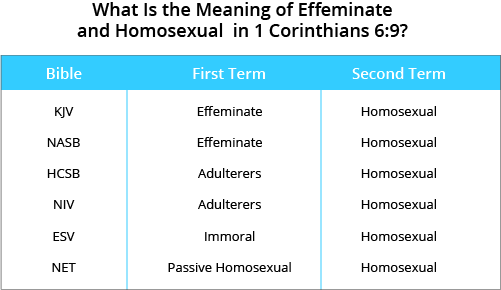Bible Question:
What is the meaning of effeminate and homosexual in 1 Corinthians 6:9?
Bible Answer:
The terms effeminate and homosexual in 1 Corinthians 6:9 are found in the King James Version and New American Standard Bibles. However, the Holman Christian Standard Bible and New International Version Bibles translate the Greek text as adulterers and homosexual. The English Standard Version Bible translates them as immoral and homosexual. The NET Bible translates the verse as passive homosexual partner and homosexual. So, what is the correct translation?

Greek Translation of Effeminate In 1 Corinthians 6:9
The NASB translates 1 Corinthians 6:9 as follows:
Or do you not know that the unrighteous will not inherit the kingdom of God? Do not be deceived; neither fornicators, nor idolaters, nor adulterers, nor effeminate, nor homosexuals, nor thieves, nor the covetous, nor drunkards, nor revilers, nor swindlers, will inherit the kingdom of God. Such were some of you; but you were washed, but you were sanctified, but you were justified in the name of the Lord Jesus Christ and in the Spirit of our God. 1 Corinthians 6:9-11 (NASB)
The Greek word for “effeminate” is malakos. The noun refers to “the passive male partner in homosexual intercourse—”homosexual.”[1] The literal sense of the word was “fine, clothing delicate to the touch.”[2] Vincent writes “Luxurious and dainty.”[3] The word is used in Matthew 11:8 and Luke 7:25 to refer to a man dressed in soft clothing. Baltz and Schneider translate malakos as “examples of passive homosexuality.”[4] Finally, Danker and Bauer explain that the word in 1 Corinthians 6:9 refers, “to being passive in a same-sex relationship., effeminate . . . of men and boys who are sodomized by other males . . .”
Greek Translation of Homosexual In 1 Corinthians 6:9
The Greek for homosexual in 1 Corinthians 6:9 is arsenokoites. The noun refers to “one who takes the active male role in homosexual intercourse.”[5] Thayer states, “One who lies with a male as with a female, a sodomite.” It is important to note that all of the Greek lexicons of the New Testament (Koine Greek) agree with these definitions.
This Greek word is a compound word of “male” and “bed” which literally has the sense of men laying in bed. That is, the message of Thayer’s lexicon which gives us additional insight with this comment, “(arsen a male; koite a bed), one who lies with a male as with a female, a sodomite.”[6]
Conclusion:
Loua and Nida summarize these two Greek words with this statement, “It is possible that arsenokoites in certain contexts refers to the active male partner in homosexual intercourse in contrast with malakos, the passive male partner.”[7] The majority of the Bible translators agree that this is the meaning of the Greek text. The NET Bible captures the correct sense of the Greek text,
Do you not know that the unrighteous will not inherit the kingdom of God? Do not be deceived! The sexually immoral, idolaters, adulterers, passive homosexual partners, practicing homosexuals, thieves, the greedy, drunkards, the verbally abusive, and swindlers will not inherit the kingdom of God. Some of you once lived this way. But you were washed, you were sanctified, you were justified in the name of the Lord Jesus Christ and by the Spirit of our God. 1 Corinthians 6:9-11 (NET)
Now lets look at the context of this passage. In verse 6, the apostle Paul is describing the unrighteous and he then lists a series of sins. His first description of an unrighteous person is that they are immoral. How many of us have lusted after a man or woman or actually committed premarital sex? Then the apostle adds idolaters and adulterers and then the effeminate and homosexuals. The rest of the list includes people characterized by their sins: thieves, the greedy, drunkards, for example. These are sins that most people clearly agree are sins. That is, those who are effeminate and homosexuals are in sin, just as other people. The important point of this divinely inspired passage is that Paul listed a group of sins that characterize the unrighteous. Then he adds that these sinners will not inherit the kingdom of God.
But notice that the apostle says these men and women are no longer like that. Now they are Christians who have been washed, set apart or made holy and declared to be righteous through Jesus Christ and the Holy Spirit. That is, at some point they recognized their sin, asked God to forgive them, and they yielded themselves to the lordship of Jesus Christ. At some point they were searching for God and became a Christian. They found peace with God. What wonderful news!
References:
1. Johannes P. Louw and Eugene Albert Nida, Greek-English Lexicon of the New Testament: Based on Semantic Domains (New York: United Bible Societies, 1996), 771.
2. James Swanson, Dictionary of Biblical Languages with Semantic Domains: Greek (New Testament) (Oak Harbor: Logos Research Systems, Inc., 1997).
3. Marvin Vincent. Vincent’s Word Studies of the New Testament. MacDonald Publishing. p. 215.
4. Baltz and Schneider. Exegetical Dictionary of the New Testament. Eerdmans Publishing. 1981. p. 381.
5. Danker and Bauer. Greek-English Lexicon of the New Testament. University of Chicago Press. 2000. p. 613.
4. James Swanson, Dictionary of Biblical Languages with Semantic Domains: Greek (New Testament) (Oak Harbor: Logos Research Systems, Inc., 1997).
5. Joseph Henry Thayer, A Greek-English Lexicon of the New Testament: Being Grimm’s Wilke’s Clavis Novi Testamenti (New York: Harper & Brothers., 1889),p. 75.
6. Joseph Henry Thayer, A Greek-English Lexicon of the New Testament: Being Grimm’s Wilke’s Clavis Novi Testamenti (New York: Harper & Brothers., 1889), p. 75.
7. Johannes P. Louw and Eugene Albert Nida, Greek-English Lexicon of the New Testament: Based on Semantic Domains (New York: United Bible Societies, 1996), 771.
Suggested Links:
Is there a verse in the Bible about homosexuality?The Bible on Same Sex Relations
Searching For God
Are You A Christian?
What is the biblical definition of sodomite?